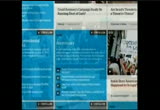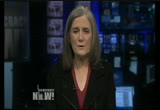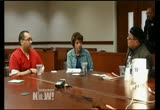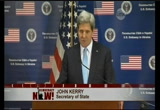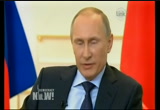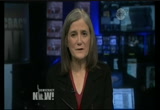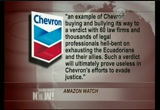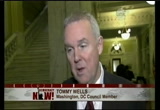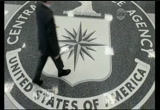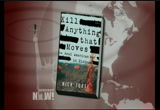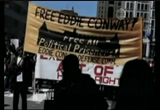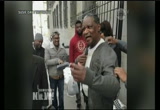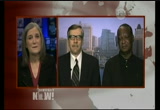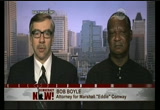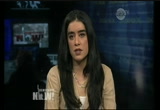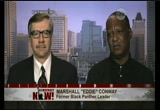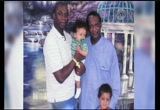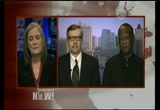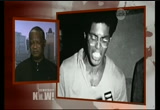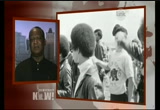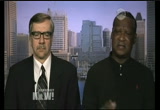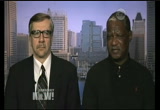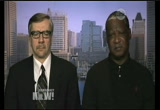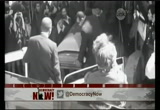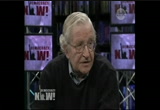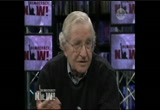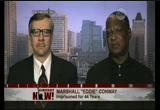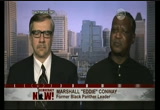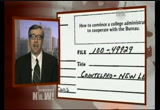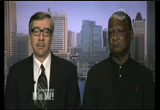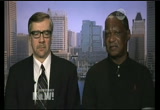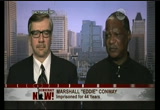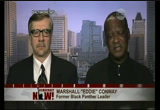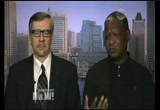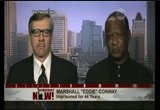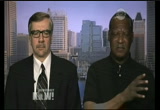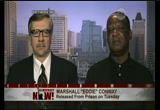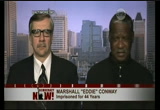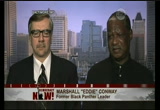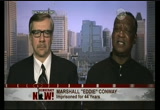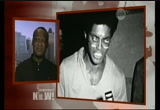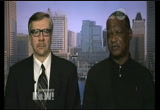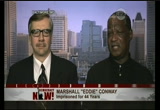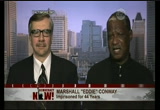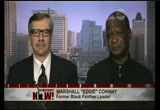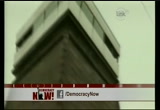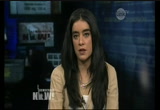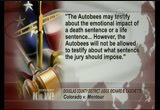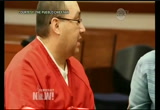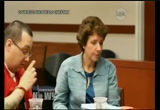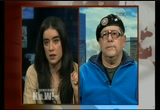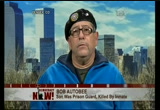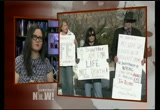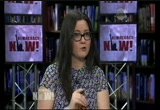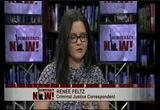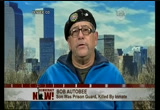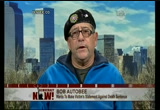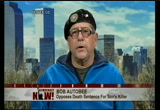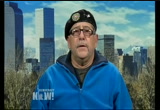tv Democracy Now LINKTV March 5, 2014 8:00am-9:01am PST
8:00 am
03/05/14 03/05/14 [captioning made possible by democracy now!] >> from pacifica, this is democracy now! >> the black panther party was the best possible hope at that time for the black community, i believe i became a target of cointelpro. >> after nearly 44 years in prison, former panther party conway isshall eddie free. he joins us today in baltimore, less than 24 hours after leaving prison.
8:01 am
then, the remarkable story of a colorado father who is now trying to prevent his son's murderer from being executed. here, anan opportunity opportunity to make something positive out of my son's death. you are part of it -- we are all a part of it. in your trial starts in january, i told him, i will be at the courthouse but i will be outside picketing because i don't deathe it is justice the penalty would not bring me any satisfaction. >> bob autobee wants to tell a jury why he opposes the death penalty for the man who killed his son who worked as a prison guard. but a judge says he cannot raise the issue in his victim's statement to the court. all of that and more coming up. this is democracy now!, democracynow.org, the war and peace report. i'm amy goodman.
8:02 am
the u.s. and russia are holding face-to-face talks today for the first time since the crisis in ukraine escalated last month. secretary of state john kerry is to meet with russian counterparts are a lover off on the sidelines of a meeting in paris. on tuesday, john kerry visited the ukrainian capital of kiev to show support for the government that replaced ousted russian -backed president viktor yanukovich. john kerry pledged around $1 billion in u.s. aid and warned russia of sanctions if it doesn't withdraw from crimea. >> if russia does not choose to de-escalate, if it is not willing to work directly with the government of ukraine as we hope they will, then our partners will have absolutely no choice but to join us to continue to expand upon steps we have taken in recent days in order to isolate russia politically, diplomatically, and economically. >> in addition to the $1
8:03 am
billion, the european union is set offer $15 billion aid package today to ukraine. on tuesday, unarmed ukrainian forces held a standoff with russian counterparts after marching on a russian position in crimea, demanding their withdrawal. the ukrainians ultimately pulled back after several hours. in his first news conference is deploying his troops around crimea last week, putin claimed he would use force only as a last resort. >> what can be the reason to use the armed forces? this is the last resort. simply, the last resort. starting lawlessness and eastern regions as well, if people ask us for help and we are ready have an official address from the current legitimate president, we reserve the right to use all options at our disposal to protect those citizens. russianputin and foreign minister sergey lavrov have denied russian soldiers are
8:04 am
occupying crimea, saying the masked troops are local forces. on tuesday, president obama criticized putin's claims. >> i know president putin seems to have a different set of lawyers, making a different set of interpretations, but i don't think that is fooling anybody. i think everybody recognizes that although russia has legitimate interests in what happens in the neighboring state, that does not give it the a means ofe force as exerting influence inside of that state. >> the white house has unveiled its proposed budget for the next fiscal year. the $3.9 trillion measure includes a reduction of tax breaks for wealthy americans and corporations, which republicans have vowed to oppose. it also targets low-income workers under the age of 25 for additional benefits, including an expansion of earned income tax credits. speaking at a washington, d.c.
8:05 am
elementary school, president obama said his budget reflects a commitment to tackling inequality. >> falling at the fastest rate in 60 years, we at the decided we're going to keep squeezing the middle class or continue to reduce the deficits responsible he -- responsibly while taking steps to grow and strengthen the middle class. the american people have made clear time and again which approach they prefer, which is the approach that my budget offers and why i'm going to fight for it this year and in the years to come as president. >> the proposed military budget for 2015 is 570 $5 billion. the pentagon is seeking an additional $79.4 billion in war funding, even though most u.s. troops are supposed to withdraw from afghanistan by the end of the year. won al giant chevron has major victory in a lawsuit it brought against victims of its pollution in the war. a group of indigenous ash indigenous plaintiffs won a landmark $9 billion judgment in
8:06 am
2011 for widespread contamination resulting from toxic dumping by texaco, which chevron later bought. chevron sued the victims and the the u.s.torney -- and attorney. on tuesday, u.s. district judge lewis kaplan agreed, ruling the plaintiffs used "corrupt means" and barred collection of their $9 billion judgment in the united states. in a statement, chevron hailed what it called a resounding victory will make the ecuadorian judgment the legitimate and unenforceable. the plaintiffs say they plan to appeal and still pursue the $9 billion judgment in other countries. in a statement, the group amazon watch called the verdict "an example of chevron buying and bullying its way to a verdict with 60 law firms and thousands of legal professionals hell-bent on exhausting the ecuadorians and their allies. such a verdict will ultimately prove useless in chevron's efforts to evade justice." an appeals court has rejected the oil giant ep's attempt to
8:07 am
limit payouts stemming from its 2010 oil spill in the goal. ep had accused local businesses of claiming fictitious losses is seeking compensation for damages from the worst offshore oil spill in u.s. history. the ruling was an injunction that had frozen the payments pending a court decision on bp's sued. the washington, d.c. city council has given final approval of a measure to decriminalize marijuana. the move would scrap criminal penalties for pot possession of favor of a violation equivalent to a parking ticket. arrested0% of those for marijuana in dcr african-american. we know a six universities, the black kids are not the only one smoking pot. worst of all, it gets at the social justice issue. once you have a drug charge, you're not going to get a job on a construction site.
8:08 am
you're going have trouble with a commercial drivers license. a lot of the jobs that are low barrier entry jobs, you're disqualified with a toward charge. >> democrat mayor vincent gray has pledged to sign the measure into law. the district of columbia would join 17 states that i've also decriminalized marijuana possession. the cia has launched an investigation of its own employees probing the torture and rendition program. members of the senate intelligence committee say cia officials illegally monitored the staffers work as they compiled the panel's exhaustive probe on cia torture. be report has yet to declassified, but reportedly documents extensive abuses in a cover-up by cia officials to congress. he tells her under wraps, but the new program reportedly began after the cia took what democrat senator udall took unprecedented action against his committee. journalist john carlos frey and nick turse have been named
8:09 am
winners of the sixth annual izzy award for outstanding achievement in independent media. the izzy award is named after legendary maverick journalist i have stone, who launched i have stone's weekly in 1953 and exposed government deception. the park center for independent media says it shows -- chose them for -- nick turse was honored for giving human form and voice to civilian victims of u.s. wars from vietnam to afghanistan. s glenn greenwald and germany scale were also
8:10 am
named the first members of the new i.f. stone hall of fame. and those are some of the headlines. this is democracy now!, democracynow.org, the war and peace report. i'm amy goodman with nermeen shaikh. >> welcome to all our listeners and viewers from around the country and around the world. marshall eddie conway is free. the former leader of the black panther party in baltimore was released tuesday after serving nearly 44 years in prison. his supporters described him as one of the country's longest held political prisoners. conway was convicted of killing a baltimore police officer donald sager. another officer was injured in the shooting. conway has always maintained his innocence. his supporters say he never received a fair trial and that much of the case was built on the testimony of a jailhouse informant. >> the shooting occurred at a time when federal and local authorities were infiltrating and disrupting the black
8:11 am
panthers and other activist groups. it later emerged the baltimore chapter of the black panthers was actually founded by undercover officers from the baltimore police department. at the time of the shooting, the fbi was also monitoring conway's actions as part of its counter intelligence program known as cointelpro. numerous groups have campaigned for years calling for marshall eddie conway's release. in 2001, even the baltimore city council passed a resolution urging the governor of maryland to pardon him. conway remained politically active in prison. in 2011, ak press published his memoir titled "marshall law: the life and times of a baltimore black panther." in prison he also started friend of a friend, group that helps young man, often gang members, resolve conflicts. it is affiliated with the american friends service committee. marshall eddie conway joins us from baltimore, less than 24 hours after being released from prison. also with him, his attorney bob
8:12 am
boyle. we welcome you both to democracy now! eddie conway, how does it feel to be free? >> i'm not sure yet. i'm still getting adjusted. i actually haven't slept at all. that i am enjoying the new environment. >> you must have been shocked yesterday in a nondescript courtroom when the judge announced you were free. >> yes. well, i had anticipated that was going to happen, but until it actually happened, i was not sure what was going to happen. >> bob boyle, can you explain what happened, what law was marshall eddie conway freed? >> good morning, amy. we have been trying various legal ways to get eddie conway out of prison for many, many years.
8:13 am
some based on counterintelligence program on the unfairness of his trial, on the ineffectiveness of counsel. a few years ago, the court of appeals of maryland held that the jury instructions, which were typically given in trials in the early 1970's -- in fact, up until 1980 -- or unconstitutional. specifically, the judge told juries back then and up until 1980 that the jury need not follow the instructions of the court, that the instructions are simply advisory. which means even though the judge told the jury that the prosecution had to prove its case beyond a reasonable doubt, for example, he also told the jury -- well, you can ignore that instruction. it is up to you whether to vote guilty or not guilty. that change in the law -- or
8:14 am
actually recognition the instruction was unconstitutional, apply to eddie conway's case. along with my cocounsel, we went back to court, as to many other prisoners in the state of maryland, earlier last year, seeking a new trial on the basis of that. the motion kind of lingered for the past year. over the course of the last few months, we reached an agreement with the state's attorney to resentence mr. conway to time served. as a result of that agreement, he was released yesterday after nearly 44 years in prison. 43 years, 11 months. >> bob boyle, is this change in law, is it likely to result in the release of other prisoners and maryland as well? >> it has already resulted in the release of many prisoners in maryland who served decades in
8:15 am
prison. it is continuing. ,ome have been denied release which for some unknown reason, but, yes, it has been and also should result in the release of more. >> eddie conway, can you talk about the experience of writing her memoir in prison? what prompted you to do that and how did you go about doing it while you were in prison? well, at some point i realized i was getting older. i realized i had a lot of experiences and a lot of history of things that had happened. they had not been recorded. i think they would have been history and they would have been lessons that have been learned through organizing in prisons that other people could
8:16 am
have used. so i think at some point, i sat down and started writing and i tried to capture what it was that we had tried to do during those turbulent years that george jackson was organizing in california and attica occurred in new york. we were trying in the state of maryland to organize prison labor unions. we were trying to organize education seminars, communication seminars. there was no prison library in the penitentiary for 2000 people. there were no books available. we organized a prison library. all of those things were collective organized activities from prisons on the ground that was an attempt to change the prison system in a way in which would be acceptable, kind of
8:17 am
going down the middle -- we were talking about carrillo warfare or such, but make things available for prisoners so they could improve their lives. that experience i thought was going to be lost as i got older and older, so i decided to start writing and wrote it down and my co-author kind of helped me shape it and develop it and whatnot. so we ended up producing that book. i hope it is something that people can see and learn and understand what we went through. >> eddie conway, can you talk about why you joined the black panther party in the 1960's, and then what happened in 1970? >> basically, i was in europe. i was a sergeant in the army in germany. i had served almost three years.
8:18 am
they had the riots in newark, new jersey. they put armored personnel carriers in the center of the black community. they pointed 50 caliber machine guns at about 25 or 30 black women standing on a corner. as i was reading this while i was in europe, basically, is said somebody had broke into the national guard armory, had came to the community and round up all the black males. the women were protesting. they basically called out the national guard to control that protest. i looked at the 50 caliber machine gun in the army personnel courier and i question what i was doing in europe. . was on my way to vietnam
8:19 am
at that point, i decided to , and the army, come home with the concept that, well, ok, we need to make changes in america and america need some from military vehicles should not be sitting in the middle of the intersection and 50 caliber machine guns should not be pointed at black women in the black community. something was wrong with that picture. and i could probably come home and help joined some efforts to kind of reform that. i join the naacp, core. the bethlehem steel workplace. basically, pressed for some white-collar jobs and whatnot. it in the process of doing all of that, i got the sense in lateca that -- this is the
8:20 am
1960's with a lot of racism going on and a lot of organizing going on. there was a lot of activities that were actually just kind of undermining the efforts the people in the black community was making to improve their lives. so as i went on, i said, ok, so more serious kind of organizing needs to happen to improve the conditions in the black community. i looked at all of the different organizations and the black panther party represented at least a serious attempt to start feeding the children, to start educating the population, to start organizing health care and stuff like that. so i joined and started working with them. i did not discover until later on that the chapter was organized by national security agent and police informants and so on. that kind of work.
8:21 am
in the process of doing the kind of work, i think some of the most active people in the organization was targeted, followed around by the cointelpro and opportunites were created with police informants or even just incidents were created that ultimately led to them destroying, like, 25 of our 37 state chapters in a period of 18 months. they locked up the primary leadership, all of the national leadership or chase them out of the country. then they started focusing on the secondary leadership. at that time, i was considered part of the secondary leadership. they pretty much locked us up or framed some of us are chased some of us out of the country. and they used an incident in baltimore where two black panthers were arrested in the
8:22 am
aftermath of a police shooting in which one policeman died in a couple others were wounded. they use that to lock me up. they locked me up and pretty much put an informant in my cell and used that to justify them .olding me in the prison system they stacked the deck in terms of my photographs into the different sets -- in two different sets of photographs. mine was the only one duplicated. to they, we took that supreme court and challenged it. we challenged other things as well. but by the time we found out cointelpro was out there and operating, pretty much the black panther party had been destroyed. >> when we come back from break, we will come back to this conversation. we're speaking with marshall eddie conway, freed today after
8:23 am
8:24 am
>> a song about black anther bobby seale. this is democracy now!, democracynow.org, the war and peace report. i'm amy goodman with nermeen shaikh. guest is marshall eddie conway, free after nearly 44 years in prison. him, one is also with of his attorneys. i want to turn to nome chomsky, the world-renowned the west who talked about cointelpro on democracy now! >> cointelpro is actually the violation oftic basic civil rights by the federal government.
8:25 am
it compares with the red scare. cointelpro in the late 1950's through all of the 1960's, finally ended their radically ended -- theoretically ended when the courts ended it in the 1970's. it was serious. it started everything going after the communist party and in the puerto rican independence party an extended with the women's movement, the new left, but particularly black nationalists. it ended up one of the events was a straight gestapo-style assassination of two black organizers, fred hampton and mark clark. literally, the fbi said of the assassinations. the police carried it out. they broke into the apartment at and fed themorning
8:26 am
take information that came from the fbi. this,formation about remarkably, was released at about the same time as watergate. as compared with this, watergate was a tea party. it was nothing. box that was nome chomsky. i want to read a comment by the vice president of baltimore's fraternal order of police who said tuesday about the release of eddie conway -- marshall eddie conway, can you respond? >> yes. the fact that i am released indicates there was something wrong with the way in which the court proceeded to convict us. people that is still alive after 32 years of
8:27 am
them discovering that they had trials and jury instructions that were wrong and faulty and flawed based on a problem with the maryland constitution. they were supposed to rectify that in 1982. it took us 32 years fighting that. it was at that time, 500 prisoners that was affected by it. 300 of those prisoners are dead today because of something the state of maryland did that was faulty. they're making it right now. and they should make it right. if you claim you support the law, then you need to support it when it is due justice, even if you oppose that justice.
8:28 am
>> just one other comment -- >> bob boyle. >> mr. conway's trial took place in january of 1971. the break-in at the office in pennsylvania which led to the disclosures concerning cointelpro did not occur until april of 1971. so it went to trial at a time when cointelpro was still active in the jury did not know that there was this campaign to neutralize the leadership in the organization of the black panther party. presented oras tried to be presented at trial that there was this campaign of neutralization and people being framed, we and his lawyers at the time lacked the information to do so. this has to be looked at in this context. and also in the context that
8:29 am
many of the victims of cointelpro remain in prison today. many -- there are former members of the like panther party who have been in jail for 40 years or more. one other thing in response, no matter what the situation is in terms of his trial, mr. conway served 44 years in prison. he is 67 years old. there comes a point, i think, with all people who aspire to justice that there is enough time. how much longer are we vindictive in terms of keeping people in prison, particularly people who have served decades and who are of a certain age? should all be let out. >> i would just like to add one thing. the sentence of life in maryland is a perl the bull sentence --
8:30 am
paroleable sentence. up until it became a political football for politicians, people were serving life sentences and doing 20, 25 years and being paroled and released and returning to society. he lost hisafter bid for presidential election up in massachusetts that life was no longer receive parole because they used the willie horton case to take away the paroleable life in maryland, even though that was legally the sentence according to the court. so lifers in maryland are now doing 40 and 50 years and technically, the judges that sentence them only intended for them to do 20 to 25 years. and we're not getting paroled in maryland as lifers based on the
8:31 am
fact there are politics involved. so now, the life sentence in maryland, which is a paroleable life sentence, has been change not because of the law, but because of politics. that in itself is wrong. >> marshall eddie conway, you spoke earlier about the work you did inside the prison organizing a labor union as well as a library. could you explain how you went about doing that and also say a little bit more about what the conditions were like in prison for you? got --, initially when i obviously, i was shocked. i had been in europe and all across the country. i have been doing a lot of stuff . i got in prison and realized there was even a library there. people.s one tv for 400 there were two radio stations.
8:32 am
i mean, this was like 1971. it seemed like it was 1930 in the maryland and attention read. of course i started working, but i also realized it was a tremendous amount of young people and young men in prison. because there wasn't anything constructive to do, there was a tremendous amount of violence. trying toed off first change the violence thing and, two, find things in which could help enhance the prisoners life. it took a long time, but eventually we came up with the friends of a friend mentoring program in which we actually start training other brothers that had streep creds -- streets cred to mentor others that came into the prison system. it made a significant difference
8:33 am
in terms of conflict and resolving problems and so on. it is those people now that is a resource that the communities need to use that of the mentoring for five and 10 years that are still in the prison system and the problem with that is, you can mentor and you can help people in the prison system, but they are already stuck in the prison system. the real solution to the problem is to address their issue for people get caught up in the prison system. that resource in the prison system, those mentors need to be in the community and they need to be working with younger people before they get sucked into the prison system. it is too late. you can do good work on that side of the wall, but you really need to do the work to make the community say from the other side. >> when he came out of prison
8:34 am
yesterday, there were those who had been helped by you, 15 at the time, who came to see you when you came out, crediting you with helping them survive. i want to ask about your family, eddie. your son, grandson. how are you able to maintain contact in prison? were you able to? >> i was able to maintain contact, but i did a poor job. lot --y, you sacrifice a you lose a lot, suffer a lot. you lose your family. you lose the different anniversary dates, the events that bond and make a family grow together. you miss those experiences. you miss the first steps in the first words of your grandchildren. you try to maintain communications as best you can. you write, you telephone and so on, but it is never a real
8:35 am
relationship because that wall is in between you. there's always a barrier between you and your family. that is inhumane, to say the least. when you talk about trying to make people whole epidemic prison and then rehabilitate -- and put them in prison and then rehabilitate them, the way you do is to tear them away from their family and tear them away from society, your diminishing their capacity to be whole right there at the beginning. that has always been a problem. problem for me and a problem for other prisoners. if you want healthy, normal human beings to come from the prison system, you're going to have to find a way to treat them normal and healthy and let them develop family ties and so on, so they won't come out in pain. so they won't come out torn away and without the experience of a
8:36 am
unified family. >> could you explain, eddie conway, how often in the time you are in prison were you able to receive visitors, your family and others, or make phone calls or maintain any communication with them? >> the phone system, you can use the phone system on a regular basis. different policies in different institutions. some you can use it every other day. of approximately eight a month. you get to see one or two family members, one or two friends. you could to see maybe one or two associates and so on. that is each month. so you can maintain some kind of communications, but there's never any real bonding there. it is not enough for that, you know --
8:37 am
>> you did not want your grandchildren to see you in prison? well, i had seen my grandchildren in prison. it is always a bad experience. excitement there is in those visitations, it is also a bad experience because the way in which the visitors are treated -- they are treated like criminals. they are treated like criminals because of association. the people they are visiting are labeled as criminals, an are treated like that also. and then it is also a bad experience when it is time to leave. it is painful from others to walk out of the visiting room and leave their sons and their. painful for fathers to do that. it is painful for love wants to do that. it is painful for children. pain thats a lot of
8:38 am
you have to endure that pain to maintain some kind of normality. trying to lessen a lot of that pain because you could see it and hear it and you know it existed. >> we're talking to marshall eddie conway. he left prison yesterday after nearly 44 years there. you mentioned you realized later it was a member of the national security agency who was involved in setting up the black panther party chapter in baltimore, eddie? >> yes. yes, the defense captain named -- he worked for the national security agency. he said at the black panther party. i was instrumental in exposing him after a lengthy
8:39 am
investigation and he fled the country. he went to canada. he infiltrated carmichael's organization, the african revolutionary party. he was exposed of their after engaging -- up there after engaging in something with the fbi. caribbean, ie believe the bahamas, and undermined some of the political movements down there and actually cost a death or two. i'm not really sure he did not cause a couple of deaths in maryland in the black panther party. which is what is part of what caused me to start investigating him. one of our members was killed as a result of something that he
8:40 am
encouraged him to do. , and as bob said, they're political prisoners all across the country from the black panther party that have been victims of the cointelpro operation. people.mined a lot of it painted the picture that caused people not to get fair trials. respondingeople into to the violence that it was encouraging. it caused a lot of our members to get assassinated. it caused a lot of conflicts with other organizations that normally would not have occurred had they not been in the background manipulating different organizations with poison pen letters, etc. as a result of the church
8:41 am
committee hearings in 1975, i believe it was, they determined that operation was created to perpetrate violence among black groups and among other groups. and that was illegal activity. and some of the agents that are dissipated and it got pardoned -- are dissipated in it got presidential pardons. but all of the like panther members that were victims of its did not receive pardons. they are still in prisons right now across the country. becausectims primarily of -- but also the climate that was created. now they have kind of like legalized most of that stuff.
8:42 am
in terms of spying and so on. >> as we wrap up, eddie, what gave you hope? most 44 years behind bars. >> i appreciate you asking me that. i want to take this opportunity to thank the tens of thousands of people that have supported me over the years and that have sent letters, postcards, marched, rallied, organized across america, around the world. those letters, postcards, rallies, marches, organizing, hope, gave me courage meant, gaining energy, and kept my spirits high. it made me know i was loved. that same love needs to go out to the other political prisoners that remain locked up today from last 40 years, most of them. one of them a little over 44
8:43 am
years. to have that same kind of support, that same kind of encouragement and that same kind of work to help get them free. because i think when you know that people work and love you, then you can do work yourself. i think those are what the political prisoners are doing -- work in their particular areas. a need to be encouraged to do that by people coming out and giving them that kind of support that i got. , nowrshall eddie conway that you're out, before we conclude, what plans do you have? >> well, i'm going to continue to work with the friends of a friend organization. i think we've saved a lot of lives. i think we can save a lot more. i'm really proud of the young men that are out now. you're our guys that three years
8:44 am
ago, four years ago, they would have terrorized the community. now they are out feeding children. now they are out giving clothing to people in the community. now they are out -- they're pursuing laws dealt prison reform. now they're talking to young high school is and so on and encouraging them not to get involved. work and in their their practice this is the way in which we need to try to address that problem. i'm going to continue to work with the friends of a friend program inside the prison system and outside the prison system, and try to see if we and expanded across the country to help save lives that are being lost. >> marshall eddie conway, thank you for being with us, free after close to 44 years in prison. former baltimore black panther
8:45 am
leader. i also want to thank bob boyle, who is one of marshall eddie conway's attorneys. eddie conway, welcome to the free world. >> thank you. >> this is democracy now!, democracynow.org, the war and peace report. i'm amy goodman. when we come back, another remarkable story as we go to colorado. stay with us. ♪ [music break]
8:46 am
>> this is democracy now!, democracynow.org, the war and peace report. i'm amy goodman with nermeen shaikh. we turn now to colorado, where a trial is set to begin today has john attention to the state's ongoing debate about its use of the death penalty. the case involves a prison inmate named edward montour was accused of beating a prison guard named eric autobee to death in 2002. he pled guilty to the murder and was convicted. the state supreme court threw
8:47 am
out his death sentence in 2007 because it was imposed by judge and not a jury as is required. now the case is back in court. this time, the killer is pleading not guilty by reason of insanity, and the victim's father who wanted to seek the ultimate punishment and the original trial is that a change of heart. >> during a meeting with prosecutors, bob autobee asked them to spare the life of his son's killer, but to no avail. in a surprising move, that not only decided to pursue another death sentence, they have succeeded in blocking autobee from making a victim's statement to the jury that expresses his request for a life sentence. last week, the judge in the case ruled --
8:48 am
for more we're joined by bob autobee and also democracy now! producer renee feltz. explain how in your victim's statement you're not allowed to say what you want to say? >> well, there's been concern from the beginning when i started picketing that i could taint the jury. at this trial has already been tainted numerous times. i feel-i have as much right to speak as the da or the defense. >> that's go to part of the video recording from when you met with your son's killer edward montour this past december along with a moderator who is trained in the method of restorative justice. this clip begins with edward montour apologizing to you. >> one thing i would like to say before we go further is i am deeply, deeply sorry for the pain i caused you and your family for killing your son. i had no right.
8:49 am
i had no right. and i am very humbled by you for ving me.e -- forgi i want to thank you because you did not have to. i'm not sure if i would have the courage to do what you're doing. you're a good man. and i want to thank you for this opportunity. >> i appreciate that. i wasn't always a good man. this isn't just about me and you. my son is over there. my wife is over there. she said she could not be in the same room with you.
8:50 am
but she forgives you. i son has forgiven you. i have forgiven you. and i'm sure eric has forgiven you. i see an opportunity here. an opportunity to make something positive out of my son's death. and you are a part of it -- we are all a part of that. when you're trial starts in january, i told them, i'll be at the courthouse but i will be outside picketing because i don't believe it is justice. that the death penalty would not bring me any satisfaction. >> that was bob autobee speaking to his son's killer edward montour. can you talk about your response to this and explain what accounted for your change of heart on the question of the death penalty? >> well, i thought of nothing more for 11.5 years. once i came back to my face and htarted reading -- my fait
8:51 am
and reading my bible, i decided that was the best course to take. i'm very happy with that decision. my life has improved immensely since that meeting. >> what was it like to meet with your son's killer? eric, your son is a prison guard. >> my younger son wasn't going to meet edward. he did not feel he was ready for it. as the meeting went on, my son stood up and said, i feel god's presence in this room and i want to be a part of it. so then he came to the table. that really made me happy because the mercy and love is starting to spread. it starts with just one or two and it will grow. >> i want to bring renee feltz into the conversation, democracy now! producer. renee feltz, can you talk about what bob's rights are to make a
8:52 am
victim's statement and colorado's constitutional amendment for victim rights and how this compares to other states? >> is incredible if you think about bob's situation. bob has his own lawyer to bring his voice into the courtroom. this, itn cases like is the prosecution working with the victim's family who want to seek justice and are on the same page. this is very unusual. to get his voice heard, he had to hire an outside lawyer. that lawyer presented an argument to the judge he should be allowed to say to the jury, i oppose the death sentence for this man who killed my son. the judge recently said, in fact , you cannot do that. the judge gave reasons that relied on another case out of oklahoma. butn talk more about that, what is interesting about colorado's law is in 1990 today voted 80% of voters to amend the constitution to let victims like bob say their piece in court in
8:53 am
a victim's statement. they to find victims as any natural person against whom a crime has been perpetrated or attempted or if the person is dead, their lawful are presented of like while. -- their lawful representative like bob. the victim can inform the district attorney and the court .n writing here you have a judge saying in fact he is not good to be allowed to testify. it is very unusual. comparing to other laws around the country, in new hampshire, in 2009 they passed a law there called the crime victims equality act. that says even if a crime victim opposes the death sentence, the prosecutors are not allowed to attend to ban them from saying their piece to the jury. part of the reason this is interesting is a jury is going to make the decision about what the punishment should be and
8:54 am
they won't be able to hear from bob directly that he doesn't want that punishment to be death. >> could you also explain, edward montour pled guilty in the original trial. why was that conviction thrown out? >> part of the reason this has been hard to cover for reporters is because it is complicated. in the original trial, bob throughout his court-appointed attorney and said, i want to represent myself -- not bob, i mean edward montour. he decided he would represent himself even though he was off his medication for being bipolar and having psychosis symptoms. said, i juste also want the judge to make a decision. it turns out that is constitutionally invalid. so that was thrown out and that is how he got back to square one. i would note, we noted in the introduction he was already in prison when he killed bob's son. why was he there? he was accused of killing his own daughter when she was just
8:55 am
months old. so he was sent back in the 1990's to this prison is a so-called baby killer. that is a hard label to wear in prison. it turns out that now edward montour's current lawyers say in fact, that death may have been an accident. it is incredible, but the coroner's office has changed the to undetermined instead of a homicide. so the very crime that landed edward montour in prison may have in fact may not have any crime at all. >> bob autobee, do you plan to sit in on the trial? >> bits and pieces, not the whole trial. i tried that once and it just drove me to depression and anxiety. at that time, i did not see justice being served. if things turn around now, i may make an appearance. >> you were a corrections
8:56 am
officer yourself and your son eric was a prison guard, that is where edward montour killed him. >> that's correct. >> you said this experience has made you very critical of the prison system and the penal system in general. could you talk about what specific changes you have been advocating and the colorado prison system? >> well, we suggested focus groups from the staff because the management has refused to listen to the people that are in the trenches. so a lot of things get by management doesn't know anything about. we also suggested different colored jumpsuits for the inmates so violent offenders could be recognized immediately. because right now colorado, we have violent and maximum security inmates in medium security facilities where they
8:57 am
have no business. unless you have read every jacket of every inmate, you don't know what they're in there for. colorednk the different uniforms would help. we even suggested talks to go on patrol with the officers rather than leaving them by themselves. there's a lot of things that could be done but the administration refuses to listen. >> renee feltz? >> i want to suggest bob described what he did in january. he went to protest against the death penalty outside the courtroom when he wasn't quite sure he would be allowed to make a statement inside. bob, could you talk about who joined you? there were other victims of murdered families that were with you for that protest, is that right? can you talk about that? >> that's correct. home, i said if you pursue the death penalty, i would fight it. >> the prosecutor in the case. but yes. -- >> yes.
8:58 am
the wife of the second officer he is alsolled, anti-death penalty. we have survivor from one of the victims of nathan dunlap who was also involved. i met with the mother of that young lady. we had a wonderful talk. i hope i was able to help her .nderstand you have to be willing to heal and let the hate go. to me, the death penalty is a hate crime. it is crimes against humanity. once you come to this site and see it for what it really is, then you know you're doing the right thing. >> bob autobee, thank you for being with us, speaking out against the death penalty for the prisoner who killed his son eric, a prison guard. renee feltz, thank you for joining us. that does it for our show.
8:59 am
158 Views
Uploaded by TV Archive on

 Live Music Archive
Live Music Archive Librivox Free Audio
Librivox Free Audio Metropolitan Museum
Metropolitan Museum Cleveland Museum of Art
Cleveland Museum of Art Internet Arcade
Internet Arcade Console Living Room
Console Living Room Books to Borrow
Books to Borrow Open Library
Open Library TV News
TV News Understanding 9/11
Understanding 9/11